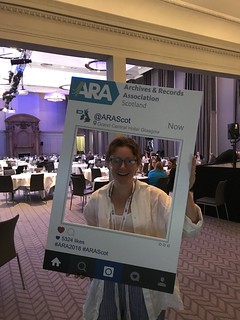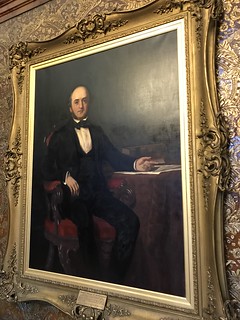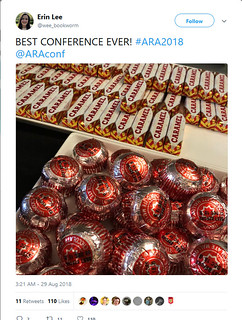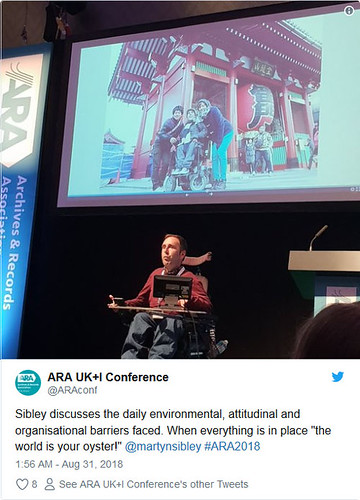Not long after the heat wave plaguing the UK ended I arrived in Glasgow for the Archives and Records Association (UK & Ireland) Conference (ARA). The theme of the conference, ‘People Make Records’, is a play on the popular travel Glasgow initiative/motto/website: People Make Glasgow. The people do make Glasgow – it’s an incredibly friendly city.

The BCIT Archivist all ready for things to get started at #ARA2018!
The conference itself was challenging, informative and well organized. All three keynotes were inspiring and shaped the conversations throughout each day. Hopefully they will also shape the future with the realization of the Glasgow Manifesto as it was called for in the final panel debate. It’s time to stop just talking and start taking action!
At ARA every day I was moved to laugh, cry and be inspired. I would like to share a few highlights from my conference experience.
Professor Augustine (Gus) John delivered the first keynote inviting archives and records professionals to radicalize the Archives. He began by listing a few anniversaries that happened in August that went by unremarked upon by most including the date August 18, 1518 when King Charles V of Spain issued a charter authorizing the transportation of slaves directly from Africa to the Americas. 2018 is 500th anniversary of the start of the transatlantic slave trade. Not widely known or marked, in contrast to the end of the slave trade. It’s easy to celebrate positive events – it’s more challenging to tell politically unsettling stories and remind the public of less savoury anniversaries. Records are power. John highlighted three main ways in which records can be obviated: willful omission, erasure and malicious changes. Archivists are not neutral. Archivists do have power. Homework from Gus John; read: The History Thieves by Ian Cobain (can be borrowed from the BCIT Library).
People make records. People tell stories. If you are ever in Glasgow I urge you to visit the Women’s Library it began in the 1990s with a passionate group of women. Equality, diversity and inclusion are core functions of the Glasgow Women’s Library. It is now funded, has it’s own building, and runs wonderful community, learning and art projects. Quotable quote from Adele Patrick of the Glasgow Women’s Library, “marginalized communities aren’t hard to reach – they are easy to ignore.” [As a sad aside – the Vancouver Women’s Library closed this past August.]
Conference delegates were lucky enough to attend a reception at the Glasgow City Chambers where we were welcomed by the City’s Mayor. I was delighted to find a connection to a presentation from earlier in the day – a portrait of the First Convener of the Water Committee.

Robert Stewart of Murdostroun, Lord Provost of the City of Glasgow 1851-1854 and First Convener of the Water Committee 1855-1856.
The Arlington Baths Club (ABC) could not have started without this man, Robert Stewart of Murdostroun, First Convener of the Water Committee 1855-1856. This portrait was “painted to commemorate his public services in successfully promoting the waterworks act of 1855 by which the citizens obtained an abundant supply of pure water from Loch Katrine.” Fifteen years later, in 1870, ABC opened as a men’s swimming pool club that also featured a library, smoking room and card room. There were no public swimming pools in Glasgow at the time. It still has an annual membership. Members are generally middle class and women were first allowed in 1882 (their first races, judged on style and grace, were held that year and the following year, like the men, they had timed races). The ABC History Group recently started a blog sharing research done at the Glasgow City Archives about past members. The stories found by the ABC History Group are a sweet reminder of the genealogical joys found in Archives.
Michelle Caswell, Assistant Professor of Archival Studies at UCLA, began the second day of the conference with another call to action. Memory work has a political urgency and meaning; marginalized communities see history repeating itself. People need to be reminded that we should not let this happen again – foundations need to be shaken. She has gathered a community and started a project called Archivists Against History Repeating Itself. Homework from Caswell: print out and put up this poster Dismantling White Supremacy. Archives need to ensure they can be trusted by marginalized communities. .

On a lighter note; Tunnock’s is a well-loved Scottish company. All locals were delighted beyond reason that caramel Tunnock’s bars were included in our welcome package and offered at coffee break more than once.
Just a couple more presentations that I would like to highlight:
- Jenny Bunn offered a thought-provoking presentation about the future of Archival Description. She kindly put a post of her musings on her blog, Trailing Along: Rambles through recordkeeping.
- Marion Kenny passionately shared with us the story or Qisetna, Talking Syria. A platform for sharing stories and connecting the Syrian diaspora. Artists, musicians, regular citizens and professional storytellers from Syria have shared their stories and found pathways to healing through this multi-lingual website. The entire panel that this presentation was part of was full of wonderful stories. I especially recommend the final presentation by Alan Butler of the Plymouth LGBT Archives.
- In the UK the Master of Archival Studies programs are only one year. In North America most Masters degrees are two years. I very much enjoyed the discussions in the Skills Digital Archivists Need session surrounding what aspects of the traditional program to cut out now that digital archives skills are required by the profession. At Aberwystwyth University, you can still take courses in Paleography, however, it is no longer possible to graduate without digital learning.

Sibley on stage for the third and final Keynote of the ARA Conference.
Martyn Sibley began our final day in Glasgow with an inspiring and thoughtful key note. He is one of the UK’s most prominent activists and advocates for disabled people, check out one of his projects Disability Horizons. Describing himself as ‘…a regular guy who happens to have a disability called Spinal Muscular Atrophy (SMA).’ Sibley challenged the room to be mindful of improving accessibility to archives and records. Rather than see only barriers focus on your strengths and what you can do to include people. Takeaway quote from Sibley ‘being inclusive for disabled people is really about good customer service.’
People make records. People make changes. Believe that positive change is possible. Together the profession can grow in many ways. Embracing the idea of radicalizing the archives to tell the uncomfortable truths in our history as Gus John urged. Dismantling white supremacy. Knowing when it is time to shut up and do the hard work that needs to be done. Ensuring that the records of the marginalized are acquired and preserved so their stories are not forgotten and history does not repeat itself as championed by Michelle Caswell. Finally, knowing our ‘inclusion superpowers’ as Martin Sibley challenged us. Championing inclusivity in our hiring practices, in education and in serving our communities.
This is an interesting conference! Your personal noes make me want to visit Glasgow one day.
It is a fabulous city! So challenging to write a short post.